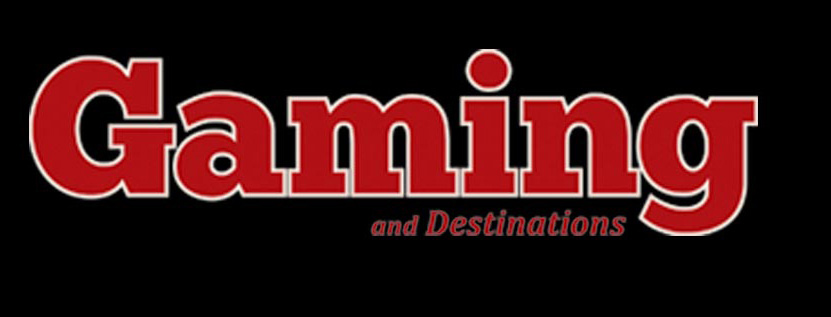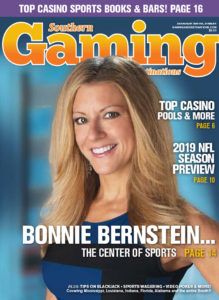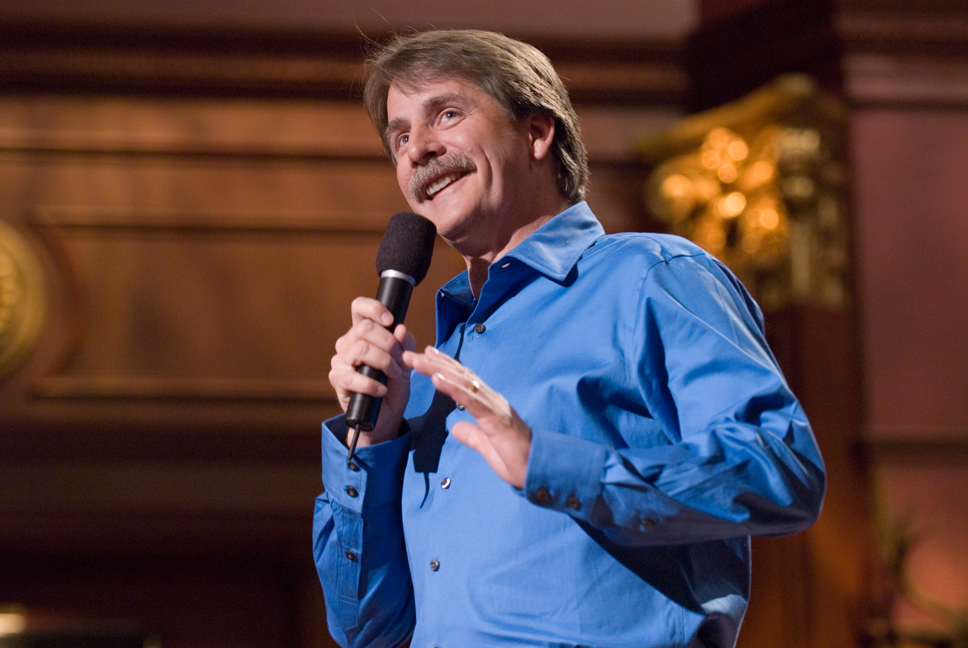 Jeff Foxworthy is one of the most respected and successful comedians in modern history and also happens to be the largest-selling comedy recording artist in history, multiple Grammy Award nominee and bestselling author of 26 books. Widely known for his redneck jokes, his acts go well beyond that to explore the humor in everyday family interactions and human nature. He is currently on tour and heading to several casinos along the way, including a stop at North Star Mohican Casino on August 20th. For his full tour visit JeffFoxworthy.com.
Jeff Foxworthy is one of the most respected and successful comedians in modern history and also happens to be the largest-selling comedy recording artist in history, multiple Grammy Award nominee and bestselling author of 26 books. Widely known for his redneck jokes, his acts go well beyond that to explore the humor in everyday family interactions and human nature. He is currently on tour and heading to several casinos along the way, including a stop at North Star Mohican Casino on August 20th. For his full tour visit JeffFoxworthy.com.
Gaming and Destinations publisher, G. Douglas Dreisbach, caught up with the King of Comedy himself to find out about what makes him tick, how he comes up with his content and what makes playing casino and resort style shows different than others.
Listen to Jeff Foxworthy tell how his ‘You might be a Redneck’ came to be:
Listen to the full interview with Jeff Foxworthy:
Douglas Dreisbach: Your list of accolades includes Grammy nominations, record sales of your products and books and so much more. Does hearing that long list of accolades ever get old?
Jeff Foxworthy: You know, it’s kind of funny. When you’re in the middle of doing all of that, it doesn’t really sink in, because I sit there and go, “26 books is a lot of books,” or “Yeah, that was a lot of records.” But when you’re in the middle of it, when you look back, you’re like, “Dang, I was busy there for a while.”
GDD: Does it ever get hard to come up with new content? And where do you find some of your creative inspiration before you go out and use it?
JF: I think I’m one of the lucky comedians, because real early in my career, I discovered what worked best for me. I trusted that if I thought of something, or if my wife says something, or my family does something, I’m going to trust that other people are thinking and saying and doing the same things that we are. And to me, when I’m onstage, to see people laugh and then elbow the person next to them, or point to the person next to them, then I said something that was funny.
I did a thing on the last special working with Larry the Cable Guy. We were talking about the fact that we have a generation that doesn’t know how to get dog poop off their shoes. But I’m like, “You know, we played outside every day, and every day somebody stepped in dog poop,” So on the stage I went through what you did. You know, first you scraped it on the edge of the curb. Then you went back and forth in a puddle, and then you did the sweeping motion on the grass. Then you got a little piece of stick, and you sat down on the curb and picked it out of the treads. As I’m describing this process, I’m thinking, “There’s not one joke in this. There’s not a joke, and people are gut-laughing, because they’re going, ‘Oh, my God, I’ve done that.’”
So that’s kind of what I’ve always done. I’ve talked about my life and if you go back and listen to an album or watch a special, it’s kind of a snapshot of whatever was going on in my life that year.
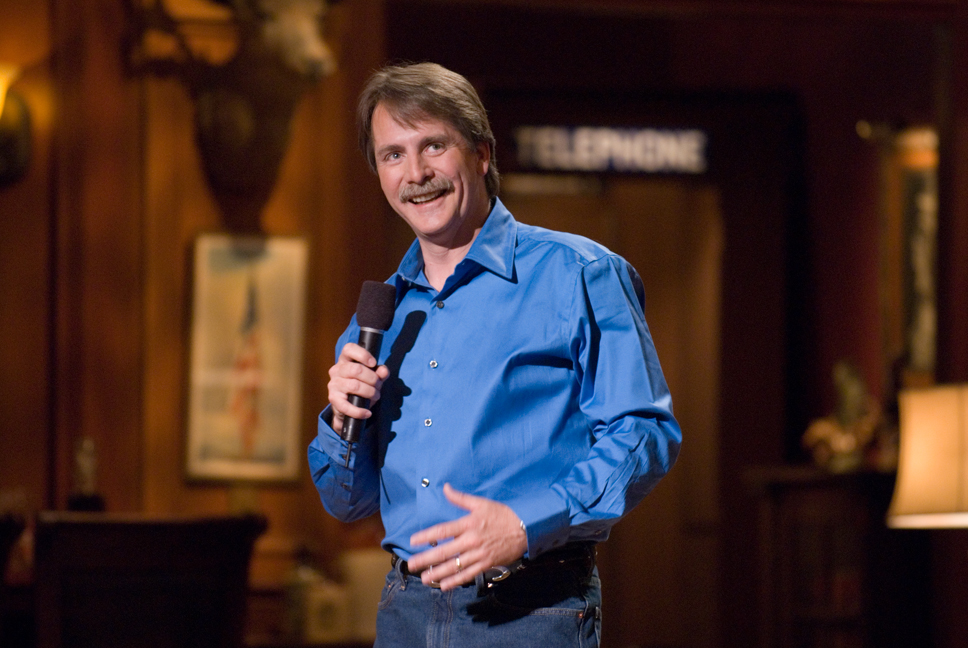
GDD: Would you say that most of your content is original from you? And has it always been that way?
JF: Yes, almost always. I’ve got a buddy in Nashville that is really funny but doesn’t go on the road. I will think of something and call him and say, “Hey, do you think this has merit to it?” And if he likes it, then I’ll go to a club and start working it out. It is kind of amazing that you never get to the point to where you know if something’s funny or not. I mean, if you and I were going to a club tonight and I had a stack of note cards with ideas on them, and you said, “Pick the four best,” two of them would probably die. I mean, I still don’t have it down. But that’s part of what amazes me. And I just keep coming back to stand-up out of everything I’ve ever done. I love the fact that you can’t figure it out.
GDD: How much of your show is scripted and how do you adjust the script based on the moods or reactions from the audience?
JF: I always know where I want to start, and I know where I want to finish. But, as you get out there, it is like a boxer. You are kind of saying, “All right, are they younger? Older? Is it more couples?” It is like a little dance, and it’s never the same way twice. But for me, knowing where I want to start and knowing where want to end has always been kind of a security blanket. Sometimes it doesn’t end up that way, but that’s kind of my plan when I walk out there.
GDD: You were part of one of the Blue Collar Comedy crew that included you and Ron White, Larry the Cable Guy, and Bill Engvall. Tell us about how that came to be.
JF: Well, when the Kings of Comedy tour started up, one of the first stops was Atlanta, where I live. I was reading about it in the paper, and it said that it was a show for the urban, hip audience. I remember calling up Bill Engvall, and I said, “You know, urban and hip leaves a lot of people out,” because we’d been on the road nonstop for 20 years. And I said, “We need to do a show for everybody else.” And he kind of laughed, and he said, “What would you call it?” And I said, “Just call it the Blue Collar Tour.” And so, we all set three months aside, me, Bill, Ron, and Larry, and we were going to try this for three months. I think we ended up doing the first tour for three years. We just had no idea that it was going to blow up like that. But it’s still, to this day, one of the most fun things I’ve ever been part of.
GDD: Did you find yourself writing new content along that tour, bouncing ideas across the room with you four? It probably had many magical moments.
JF: Well, yeah, and part of the reason it was the four of us was, we all kind of started around the same time and we were buddies back in those early days when nobody was making any money and we just all remained friends over that time. In fact, when we pitched the idea of doing the four of us, the promoter wanted to do a big number at the end, something like a silly song or whatever. Being not only a comic, but being a fan of comedy, I remembered growing up watching the Carol Burnett Show, and my favorite thing was when they made each other laugh.
And I thought, “People never see a comic laugh. If we do our job right, we keep a straight face, and the audience laughs.” So, I said to the promoter, “Instead of doing something big, can we just bring out four stools and tell stories and try to make each other laugh?” And they were like, “Well, we can try it. We’ll see if it works.” And there was no way to rehearse it. And so, that first night of the tour, we were in Omaha, Nebraska, and there were 9,000 people, and I was the fourth one up out of the four of us. At the end of it, I said, “Hey, let’s bring the other three guys back and just tell a few stories.” And we had no idea if it was going to work or not, and we got to the end of it and said good night, and 9,000 people stood up. We got a standing ovation, and we kind of looked at each other and went, “Oh, my God, it worked.”
So, that was always, I think, our favorite part of it every night, was just trying to make each other laugh.
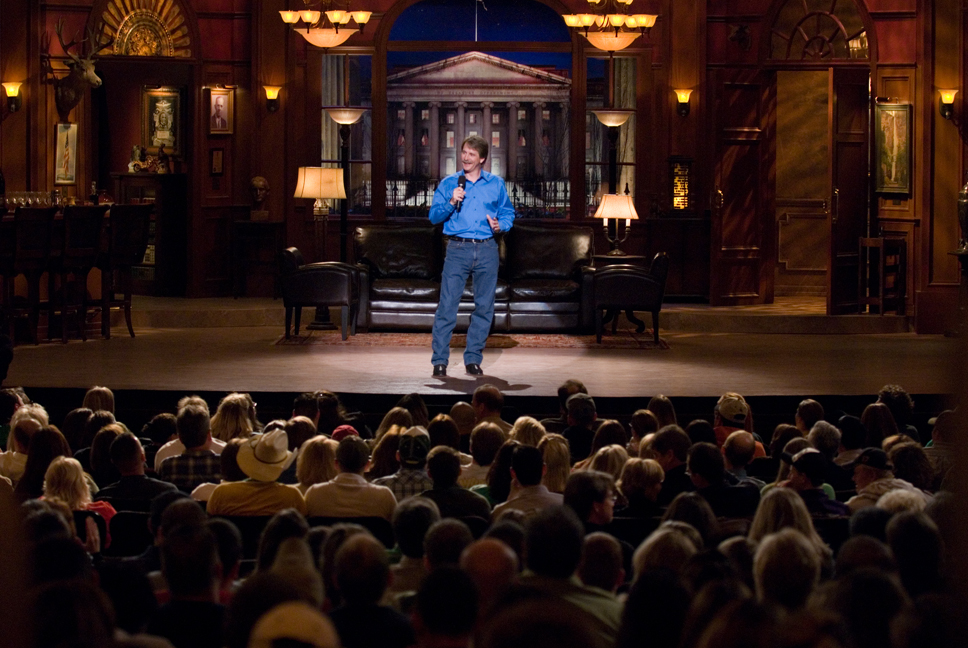
GDD: You mentioned Carol Burnett as an early influence and exposing you to comedy. Who were some other early influences you liked?
JF: Well, it’s probably politically incorrect, but Bill Cosby was a huge influence, not accounting for what he did in his personal life, but as a stand-up, I liked him. He talked about family stuff. He was funny without being dirty and he was an influence. Bob Newhart was an influence. Later on, it was Carlin and Pryor, but that was after I got headphones, so my mom couldn’t hear what I was listening to.
When I got into comedy, Rodney Dangerfield was great about helping younger comics and he helped me a lot and even put me on one of his HBO Young Comedian specials.
Jay Leno was fabulous. I mean, I remember being an open-mic-er, and Jay would sit there with me at the Waffle House at one in the morning and tell you what you needed to know. There were always huge influences along my career.
GDD: Was there an “aha” moment where you realized you had the knack for entertaining?
JF: I do think that you’re either born funny, or you’re not. I mean, I think you can get better at it, but you have to be born with the talent. I remember as a kid I knew I could make people laugh but I never thought that being a comedian was a career option. I’d save up my allowance, and I’d buy comedy records. I’d memorize them. I’d go to school and do them and always got in trouble. Every report card was, “Jeff talks too much in class,” because I was trying to make people laugh.
I actually had a real job and worked at IBM for a while. I was the guy that was always in the break room doing impersonations of the boss, and turn around, and the boss is standing in the doorway. A bunch of guys I worked with used to go down to a local comedy club in Atlanta called The Punchline. They kept coming back to work, going, “Foxworthy, you’re funnier than these people. You need to do this.” And they entered me in a competition, not like an amateur night, but a competition for working comedians, called the Great Southeastern Laugh-Off. And I’m like, “Oh, dadgum, I’ve got to go write something.” I wrote five minutes about my family, and I went down there and did it, and I won the competition. I just remember I was scared to death, but a minute and a half into it, I’m like, “This is what I want to do. This is it. This is what I was born to do.” I still remember telling my parents I was quitting my job at IBM. My mother’s first question was, “Are you on the dope?” whatever the dope was. And I’m like, “No, I just really think I could do this. I just have such a passion for it.” And five years later, I was on Johnny Carson, and the same mother said, “You know, you wasted all those years at IBM.” And I’m like, “OK, whatever, Mom.”
You know the crazy thing about it is, I’ve been doing it now for 37 years. I still love it just as much. I am so blessed to have made a fabulous living doing something I would have done for free, and after three and a half plus decades, I still love it. I still enjoy it so much.
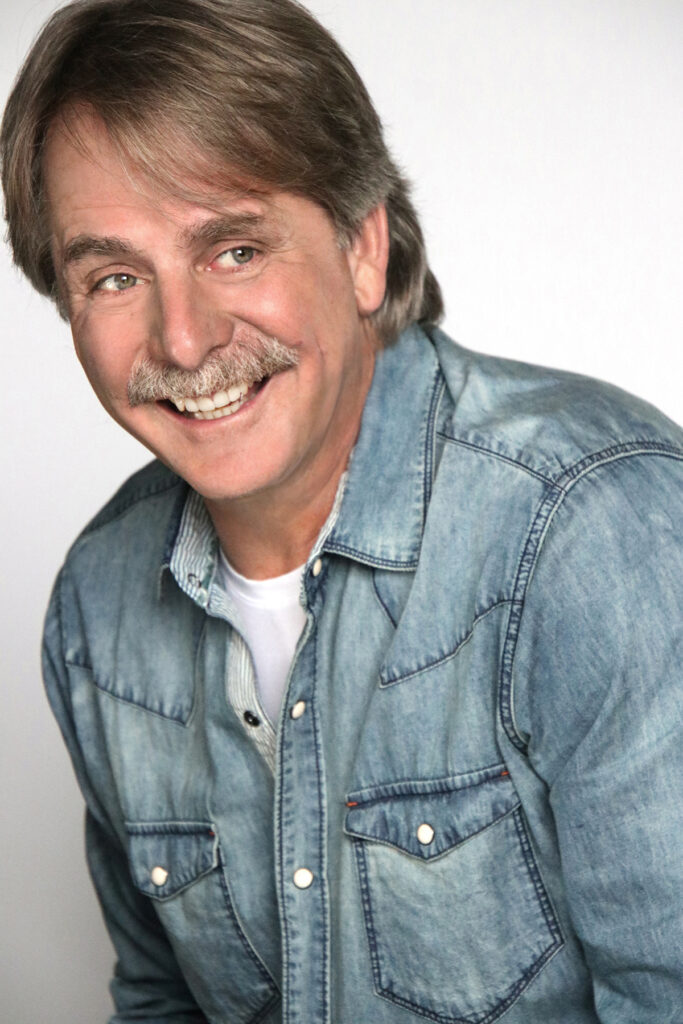 GDD: Over those years you played many different venues. One of your upcoming stops includes North Star Mohican Casino Resort in Wisconsin on August 20th, as well as several other casino stops. Do you find the mood of audience’s change based on the venue? So if you’re at a casino show, is that different than a comedy club or corporate event? And how do you adjust your content based on those situations?
GDD: Over those years you played many different venues. One of your upcoming stops includes North Star Mohican Casino Resort in Wisconsin on August 20th, as well as several other casino stops. Do you find the mood of audience’s change based on the venue? So if you’re at a casino show, is that different than a comedy club or corporate event? And how do you adjust your content based on those situations?
JF: If it’s just a regular concert, then you know people paid to see you. They want to see you. And it’s the same at a casino, except at a regular concert, you don’t have people sitting out there that may have just lost $10,000. So, sometimes, in a casino, not the majority of the audience, but there’s some that you’re like, “All right, it’s going to take them a minute to change gears.” At a corporate event, nobody pays to see you. You are just the entertainment. So, with one of those, I’ll start slower and a little more deliberate, because I’m thinking, “Well, there’s people here that may not even know who I am.” But at the end of it, I always find that if I’m having fun, then usually it ends up that they are having fun too.
And you know, it is fun. It’s fun for me, making people laugh. In fact, I was telling someone the other night that I never felt like laughter made your problems go away, but laughter is like the release valve that keeps the boiler from exploding. It’s how we all let off steam, laughter and live music. If you think about, for the last year, what are the two things that nobody’s had? We haven’t had laughter, and we haven’t had live music, and those are kind of the great stress relievers. So, you’ve got a lot of entertainers out there that are just itching to get back.
GDD: Do you have any pet peeves when you perform? Like hecklers or late arrivals? Or are you in a black hole in the world of Jeff, and just roll with it?
JF: I’m lucky that I’ve never gotten heckled very much. I think it’s probably because I’m not mean-spirited. The thing that took a while to get used to in the beginning of my career, I made most of the big money that I made selling records and selling DVDs, and they would always make the announcement, “No recording of this, no cameras, no whatever.” Well, now when you’re onstage, every third person has their phone up recording you. But of course, now nobody sells comedy records. There’s no need to, because it’s all over the Internet. But when I’m onstage now, I’m thinking, “Lord, this is going to be on the Internet before I get back to the hotel tonight.”
So, that’s a little bit weird, but I’ve come to just be used to it. Other than that, you kind of learn to make jokes. If somebody comes strolling in late, invariably they are on the front row in the middle, and so it kind of stops the show. But you learn how to deal with that. And I’m like, “If you’re going to be late, then I’m going to embarrass you and make you talk to me for a little while.” I just enjoy the whole experience, and I’ve just missed it.
GDD: During COVID and the height of the quarantine, we saw a lot of artists doing livestreams, staying connected to their audiences, and other creative collaborations. Did you tune in to any of those? Or did you ever consider doing any livestreams or recording anything like that?
JF: I tried doing one early on for a company, it was like a Zoom meeting, and it was so bizarre. I couldn’t hear anybody laughing. I told my manager that I could not do that again, it was just too weird. It felt like I was standing up in front of the mirror in my bathroom. But I’ve talked to friends that have done some of the drive-in things and all, and instead of laughing, they’re hearing people honk their car horns and whatnot.
But it’s different for all of us. Right before COVID hit, about halfway through 2019, I decided, “All right, I’m doing all new material,” and I literally started from scratch, where I’m going into a comedy club on a Monday night with 30 people in there, with just note cards, going, “Hey, is this funny? Is this funny?” And I’ve built up a new hour and a half and just gotten to the point that it was polished. Netflix was wanting me to do a new special, and I was just to the point of being ready to do that special, and then COVID hit. And I’m like, “Oh, dadgum it.”
They asked me if I could do it without an audience, but I had to decline based on my Zoom call. I just thought that they were not going to like it. I was not going to like it and it was just going to be weird. But I have a lot of new ideas out there that I know are funny. I just haven’t had a chance to show them to anybody.
GDD: What kind of new things are you working on or ready to release?
JF: A couple years ago I invented a card game called Relative Insanity. I wrote 500 punchlines, and 100 set-ups about relatives, about family. So, the set-up might be something like, “Right before we walked down the aisle, Daddy leaned over to me and whispered _____.” Everyone playing has seven punchlines, and they just throw the card they think is going to get the biggest laugh. That thing ended up being the top-selling game on Amazon! So, when COVID hit, I decided to write four expansion packs for the game that will be out this summer so that will be a lot of fun. I also have a couple TV projects in the works, but everything kind of slammed to a halt, so hopefully by the fall, we can start doing at least one of those.
GDD: Probably one of your biggest successes has to be the You Might be a Redneck series. How did that come about? And were you surprised at how well it did?
JF: Oh, I was shocked! It started because I’ve got this thick Southern accent, and I grew up out in the country, hunting and fishing. So, when I got into comedy, if I’d go to New York or L.A., the only advice I got was, “You know, Jeff, you’ve got to take some voice lessons and lose that stupid accent you got.” And I’m like, “Well, where I come from, you have a stupid accent.” And so, I was stubborn about the accent. I drove a truck. I wore blue jeans and cowboy boots. I talked like this. And it was always good-naturedbut everywhere I was going, people were like, “Oh, Foxworthy, you’re just an old redneck from Georgia.”
Before comedy, I’d never really been out of the South but by then I was going around the country and found out that accents and ‘rednecks’ weren’t just a Southern thing, they were a 15 minutes outside of every city thing. So, one night, I was playing in a club in Lavonia, Michigan, and after the show we were sitting around the bar at the club, talking, and they’re kidding me about being a redneck. Well, the club we were playing in was attached to a bowling alley that had valet parking. And I said, “Wait a minute. If you don’t think you have rednecks in Michigan, come look at the window. People are valet parking at the bowling alley.”
I went back to the hotel that night, never thinking it was going to be a hook or books or whatever, and I wrote ten ways to help people tell if they were a redneck or not and I went back to the club the next night and tried it. Not only were people laughing, but they were pointing at each other too! I thought, “Well, if I can write 10, can I write 50 of them? If I write 50, can I write 300 of them?” So I kind of put it into a book form and got turned down by the first 14 publishers that I sent it to. Then, the fifteenth one I sent it to said, “Well, yeah, come in and we’ll talk about it,” and I went in, and he said, “You know, this is kind of funny.” He said, “I think we might try to publish this. How does $1500 sound?” And honestly, I didn’t know if he was asking me for $1500, because I didn’t have it, and he’s like, “No, no, no, we’ll pay you.” I’m like, “Well, then, yeah, let’s do it.”
I remember saying to him, “How many do you think we might sell?” And he said, “You know, I wouldn’t be surprised if we didn’t sell 5,000 of them.” I think that first book sold four and a half million copies. So, from then on, every time I saw him, I would say, “Hey, I’m glad you don’t know anything more about the book business than I do!”
I never saw it coming. He never saw it coming. They were one-liners. They were easy to remember. They were easy to retell, and I think that’s what made people gravitate to them. I quickly found out the true ones always got the biggest laughs. So, when people would say, “How do you come up with these?” I’m like, “There’s no research. It’s my family and my friends!”
Even at the height of it, it was five minutes out of a two-hour show, but people remembered them and like I said, they were one-liners.
GDD: If you could go back and give advice to a young Jeff Foxworthy, what would it be?
JF: I would probably say to talk about the things you know about. Don’t try to be somebody else. And learn to write everything down, because I think most people have the thoughts that comics have, because too many times after shows, people will come back to the dressing room, and they’re like, “I’ve done that,” or “I’ve thought that,” or “I’ve said that.” And so, you learn to grab these thoughts. Everywhere I go, I’ve got five or six note cards in my back pocket, and I just learn to write them down because you think you’re going to remember it later, and you never do. So, learn to write everything down, and just be you. Don’t try to be Jerry Seinfeld. Don’t try to be Jim Gaffigan. Just be you and talk about the things that you know about.
Quick Hits with Jeff Foxworthy
- Hobbies: Painting and drawing. I also like to look for arrowheads and artifacts as well as bow hunt and fish. I’ve got a farm and when I’m not working, I’m usually carrying something up on a tractor somewhere. I also have a six-week-old grandson, I am a grandfather for the first time! grandfather for the first time.
- Pets: A four-month-old Pomsky dog. It’s half husky, half Pomeranian.
- Sports teams: Atlanta teams. Braves, Falcons, and especially, the Georgia Bulldogs!
- Musicians/Bands: Too many. I grew up listening to Elton John, Springsteen, Billy Joel, that kind of stuff. But now I listen to everything, from ‘60s up to now
- Books/Podcasts/Mini-Series: We are watching Queen’s Gambit right now. I’m reading a John Grisham book. I read about a book a week, and I listen to a ton of podcasts. I kind of like the true crime ones. I don’t know why, but as a whole, comics are kind of fascinated with that kind of stuff, the murder shows, that and Elvis. And don’t ask me why, but most comics I know are fascinated by both of them.
- Place to vacation or visit? Hawaii was awesome, we loved that. We also loved Italy, and if you ever go, try the spaghetti.
- Place you have not visited that you would like to? I want to go see the Galapagos before I get too old and before it changes.
- Brand of blue jeans? For most of my life it was Levi’s, but now I’m wearing Buffalo, because they have a little bit of the stretchy waistband that, and, thanks to COVID, I’m loving the stretchy waistband.
*For more great articles, gambling tips, casino reviews and more… subscribe to Southern & Midwest Gaming and Destinations for just $20! Check it out!
